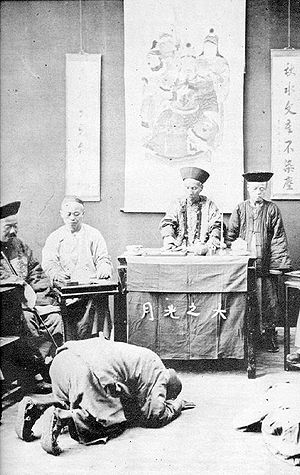
Nucai
Encyclopedia
Nucai is a Chinese
term that can be translated as flunkey, lackey, yes-man, servant, slave, or a person of unquestioning obedience. It originated in the nomadic tribes of northern China as a negative and derogatory term, often reserved for insult for someone perceived to be useless or incompetent. However, it was used most prominently in the Qing Dynasty
as a deprecatory first-person pronoun
by Manchu officials at court when addressing the Emperor
. Han Chinese officials were not allowed to use the term for self-address; they used Chen instead.
 During the Qing Dynasty, addressing oneself as Nucai was became a sort of "privilege" reserved for ethnic Manchu
During the Qing Dynasty, addressing oneself as Nucai was became a sort of "privilege" reserved for ethnic Manchu
officials. Officials of Han Chinese
origin were forbidden to address themselves as Nucai, and must address themselves as Chen . The rule was applied both in written and spoken situations. Such a rule surrounding the term Nucai reflected that the relationship between Manchu officials and the Emperor as that between "master and servant" in a household, while that between Han Chinese officials and the Emperor as simply between ruler and subject. The equivalent Manchu term for Nucai is Booi Aha
. The exclusivity of the term Nucai meant that Han Chinese officials are given lower status at court, even though Chen was historically considered as a more prestigious form of self-address.
Chinese language
The Chinese language is a language or language family consisting of varieties which are mutually intelligible to varying degrees. Originally the indigenous languages spoken by the Han Chinese in China, it forms one of the branches of Sino-Tibetan family of languages...
term that can be translated as flunkey, lackey, yes-man, servant, slave, or a person of unquestioning obedience. It originated in the nomadic tribes of northern China as a negative and derogatory term, often reserved for insult for someone perceived to be useless or incompetent. However, it was used most prominently in the Qing Dynasty
Qing Dynasty
The Qing Dynasty was the last dynasty of China, ruling from 1644 to 1912 with a brief, abortive restoration in 1917. It was preceded by the Ming Dynasty and followed by the Republic of China....
as a deprecatory first-person pronoun
Pronoun
In linguistics and grammar, a pronoun is a pro-form that substitutes for a noun , such as, in English, the words it and he...
by Manchu officials at court when addressing the Emperor
Emperor of China
The Emperor of China refers to any sovereign of Imperial China reigning between the founding of Qin Dynasty of China, united by the King of Qin in 221 BCE, and the fall of Yuan Shikai's Empire of China in 1916. When referred to as the Son of Heaven , a title that predates the Qin unification, the...
. Han Chinese officials were not allowed to use the term for self-address; they used Chen instead.
Usage

Manchu
The Manchu people or Man are an ethnic minority of China who originated in Manchuria . During their rise in the 17th century, with the help of the Ming dynasty rebels , they came to power in China and founded the Qing Dynasty, which ruled China until the Xinhai Revolution of 1911, which...
officials. Officials of Han Chinese
Han Chinese
Han Chinese are an ethnic group native to China and are the largest single ethnic group in the world.Han Chinese constitute about 92% of the population of the People's Republic of China , 98% of the population of the Republic of China , 78% of the population of Singapore, and about 20% of the...
origin were forbidden to address themselves as Nucai, and must address themselves as Chen . The rule was applied both in written and spoken situations. Such a rule surrounding the term Nucai reflected that the relationship between Manchu officials and the Emperor as that between "master and servant" in a household, while that between Han Chinese officials and the Emperor as simply between ruler and subject. The equivalent Manchu term for Nucai is Booi Aha
Slavery in seventeenth-century China
Booi Aha is a Manchu word literally meaning "household person", referring to a hereditarily servile people in the 17th century China. It is often directly translated as the "bondservant", although sometimes also rendered as "Nucai" or "slave".-Usage:In his book China Marches West, Peter C...
. The exclusivity of the term Nucai meant that Han Chinese officials are given lower status at court, even though Chen was historically considered as a more prestigious form of self-address.

